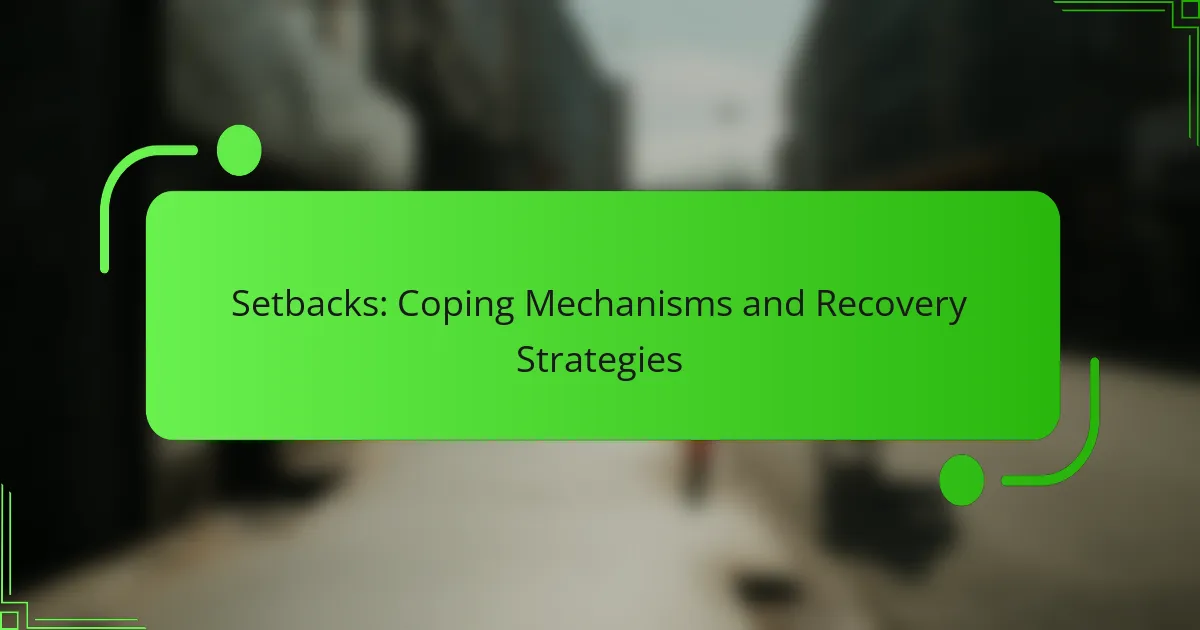Self-sabotage is a common barrier to personal growth, often manifesting as procrastination, negative self-talk, or avoidance. Identifying these detrimental behaviors and emotional patterns is crucial for fostering a more positive mindset and achieving one’s goals. By employing effective strategies such as cognitive behavioral techniques and mindfulness practices, individuals can break free from self-imposed limitations and pave the way for personal success.

What are effective strategies to overcome self-sabotage?
Effective strategies to overcome self-sabotage include cognitive behavioral techniques, mindfulness practices, goal setting frameworks, accountability partnerships, and professional therapy options. These approaches can help individuals identify and change negative thought patterns, enhance self-awareness, and establish supportive environments for personal growth.
Cognitive Behavioral Techniques
Cognitive behavioral techniques focus on recognizing and altering negative thought patterns that contribute to self-sabotage. By identifying automatic thoughts and challenging their validity, individuals can replace them with more constructive beliefs. For example, if someone thinks, “I always fail,” they can reframe it to, “I have succeeded in the past and can learn from my mistakes.”
Common methods include journaling, thought records, and cognitive restructuring. These tools help track thoughts and emotions, making it easier to spot triggers and develop healthier responses.
Mindfulness Practices
Mindfulness practices encourage individuals to stay present and aware of their thoughts and feelings without judgment. Techniques such as meditation, deep breathing, and body scans can reduce anxiety and increase self-awareness, making it easier to recognize self-sabotaging behaviors as they occur.
Engaging in mindfulness regularly can help cultivate a more compassionate mindset, allowing individuals to respond to challenges with greater resilience. Simple practices, like dedicating a few minutes each day to focused breathing, can yield significant benefits over time.
Goal Setting Frameworks
Goal setting frameworks, such as SMART (Specific, Measurable, Achievable, Relevant, Time-bound), provide a structured approach to establishing and pursuing objectives. By breaking larger goals into smaller, manageable tasks, individuals can reduce feelings of overwhelm and increase motivation.
It’s crucial to regularly review and adjust goals based on progress and changing circumstances. Setting realistic deadlines and celebrating small achievements can further enhance motivation and commitment to personal growth.
Accountability Partnerships
Accountability partnerships involve partnering with someone who can provide support and encouragement in pursuing goals. This relationship can help individuals stay committed and motivated, as sharing progress and challenges fosters a sense of responsibility.
Choosing a partner who understands your goals and can provide constructive feedback is essential. Regular check-ins, whether weekly or bi-weekly, can help maintain focus and provide opportunities to discuss setbacks and successes.
Professional Therapy Options
Professional therapy options, such as cognitive behavioral therapy (CBT) or dialectical behavior therapy (DBT), can offer tailored support for overcoming self-sabotage. Therapists can provide tools and strategies to address underlying issues and develop healthier coping mechanisms.
Seeking therapy can be particularly beneficial for those struggling with deep-seated patterns of self-sabotage. Many insurance plans cover mental health services, making professional help accessible for a broader audience.

How can self-sabotage be identified?
Self-sabotage can be identified through specific behaviors and emotional patterns that hinder personal growth and success. Recognizing these signs is the first step toward overcoming them and fostering a more positive mindset.
Common Behavioral Signs
Common behavioral signs of self-sabotage include procrastination, perfectionism, and avoidance of challenging situations. For instance, someone might delay starting a project due to fear of failure, or they may set unrealistically high standards that prevent them from completing tasks.
Other signs can include self-criticism and engaging in negative self-talk, which can undermine confidence and motivation. Identifying these behaviors is crucial for addressing the underlying issues driving them.
Emotional Triggers
Emotional triggers often play a significant role in self-sabotage. Feelings of inadequacy, fear of rejection, or anxiety about change can prompt individuals to undermine their own efforts. For example, someone might withdraw from social situations due to a fear of being judged, which can limit opportunities for connection and growth.
Recognizing these emotional triggers involves paying attention to situations that provoke strong negative feelings. Keeping a journal can help track these emotions and their associated behaviors, making it easier to identify patterns over time.
Self-Reflection Techniques
Self-reflection techniques can be effective in identifying self-sabotage. Regularly setting aside time for introspection, such as through journaling or meditation, allows individuals to explore their thoughts and feelings in a structured way. This practice can reveal insights into behaviors that may be holding them back.
Another useful technique is seeking feedback from trusted friends or mentors. They can provide an outside perspective on behaviors that may not be evident to the individual. Additionally, asking oneself reflective questions, like “What am I afraid of?” or “How is this behavior helping or hurting me?” can lead to deeper understanding and change.

What impact does self-sabotage have on personal growth?
Self-sabotage can significantly hinder personal growth by creating barriers to achieving goals and fostering negative self-perceptions. This behavior often manifests as procrastination, negative self-talk, or avoidance, which can derail progress and limit potential.
Effects on Mental Health
Self-sabotage can lead to increased anxiety and depression, as individuals may feel trapped in a cycle of failure and self-doubt. This negative mindset can create a feedback loop, where poor mental health further fuels self-destructive behaviors.
Recognizing these patterns is crucial for breaking the cycle. Techniques such as mindfulness and cognitive behavioral therapy (CBT) can help individuals identify and change their self-sabotaging thoughts and behaviors.
Influence on Relationships
Self-sabotage can strain personal relationships by fostering mistrust and resentment. When individuals engage in self-destructive behaviors, they may push loved ones away or create conflict, leading to isolation.
To improve relationships, open communication is essential. Sharing feelings and seeking support can help mitigate the effects of self-sabotage, allowing for healthier interactions and stronger bonds.
Career Progression Challenges
In the workplace, self-sabotage can manifest as missed deadlines, reluctance to take on new challenges, or avoidance of networking opportunities. These behaviors can stall career advancement and limit professional growth.
To combat this, setting clear, achievable goals and seeking mentorship can provide guidance and accountability. Regularly reflecting on accomplishments can also help build confidence and counteract self-sabotaging tendencies.

What are the psychological roots of self-sabotage?
The psychological roots of self-sabotage often stem from deep-seated fears and beliefs that hinder personal growth. Understanding these roots can help individuals identify patterns that lead to self-defeating behaviors and take steps to overcome them.
Fear of Failure
Fear of failure is a significant contributor to self-sabotage, causing individuals to avoid taking risks or pursuing goals. This fear can manifest as procrastination or self-doubt, leading to missed opportunities and unfulfilled potential.
To combat this fear, individuals can start by reframing their perspective on failure. Viewing setbacks as learning experiences rather than definitive endpoints can reduce anxiety and encourage action.
Low Self-Esteem
Low self-esteem often leads to self-sabotaging behaviors, as individuals may not believe they deserve success or happiness. This mindset can result in self-criticism and a reluctance to pursue goals, reinforcing negative beliefs.
Building self-esteem involves recognizing personal strengths and achievements. Keeping a journal of accomplishments, no matter how small, can help shift focus from perceived shortcomings to positive attributes.
Perfectionism
Perfectionism can drive self-sabotage by setting unrealistically high standards that are difficult or impossible to meet. This can lead to chronic dissatisfaction and avoidance of tasks that may not meet those standards.
To manage perfectionism, individuals should aim for progress rather than perfection. Setting achievable goals and celebrating small successes can help create a healthier mindset and reduce the pressure to be flawless.

How does self-sabotage manifest in daily life?
Self-sabotage often appears in daily life through behaviors that hinder personal growth and success. Common manifestations include procrastination, negative self-talk, and avoidance of tasks or situations that could lead to progress.
Procrastination Patterns
Procrastination is a prevalent form of self-sabotage where individuals delay tasks despite knowing it may lead to negative consequences. This behavior can stem from fear of failure, perfectionism, or feeling overwhelmed by the task at hand.
To combat procrastination, break tasks into smaller, manageable steps and set specific deadlines. For example, if a project is due in two weeks, aim to complete a portion of it each day rather than waiting until the last minute.
Negative Self-Talk
Negative self-talk involves internal dialogues that undermine confidence and self-worth. Phrases like “I can’t do this” or “I’m not good enough” can create a cycle of self-doubt that prevents individuals from taking action.
To counter negative self-talk, practice reframing these thoughts into positive affirmations. Instead of saying “I can’t,” try “I will do my best” to foster a more constructive mindset.
Avoidance Behaviors
Avoidance behaviors manifest when individuals steer clear of situations or tasks that provoke anxiety or discomfort. This can include skipping social events, neglecting responsibilities, or avoiding challenging conversations.
To address avoidance, gradually expose yourself to the situations you fear. Start with small steps, such as attending a brief social gathering or tackling a minor task, to build confidence and reduce anxiety over time.

What role does social support play in overcoming self-sabotage?
Social support is crucial in overcoming self-sabotage, as it provides emotional encouragement and practical assistance. Friends, family, and community can help individuals recognize negative patterns and motivate them to pursue positive changes.
Understanding social support
Social support refers to the emotional and practical resources provided by others, which can significantly influence an individual’s ability to confront self-sabotaging behaviors. This support can come in various forms, including emotional backing, informational advice, and tangible help.
For example, having a friend to talk to about challenges can help clarify thoughts and feelings, making it easier to identify self-sabotaging behaviors. Additionally, support groups offer a space for sharing experiences and strategies for overcoming these obstacles.
The impact of social support on self-sabotage
Social support can mitigate feelings of isolation and self-doubt, which often fuel self-sabotage. When individuals feel connected and supported, they are more likely to take risks and pursue their goals without the fear of failure holding them back.
Moreover, positive reinforcement from others can help individuals stay accountable. For instance, sharing goals with a supportive friend can create a sense of obligation that encourages follow-through and reduces the likelihood of falling back into self-sabotaging habits.
Building a supportive network
To effectively combat self-sabotage, it’s essential to cultivate a strong support network. Start by identifying individuals who are positive influences and willing to provide encouragement. This may include friends, family members, mentors, or even professional counselors.
Engaging in community activities, such as clubs or workshops, can also expand your network. Surrounding yourself with like-minded individuals can foster a sense of belonging and motivate you to overcome self-sabotaging tendencies.
Do’s and don’ts of seeking social support
When seeking social support, consider these do’s and don’ts:
- Do: Communicate openly about your struggles and goals.
- Do: Be specific about the type of support you need.
- Don’t: Rely solely on one person for all your support needs.
- Don’t: Dismiss the advice or feedback from your support network.
By actively engaging with your support system and being receptive to their input, you can create a more robust foundation for overcoming self-sabotage.



